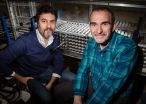INFORMATION:
For more information or to download a copy of the Panel's report, visit the Council of Canadian Academies' website, http://www.scienceadvice.ca.
About the Council of Canadian Academies
The Council of Canadian Academies is an independent, not-for-profit organization that began operation in 2005. The Council undertakes independent, authoritative, science-based, expert assessments that inform public policy development in Canada. Assessments are conducted by independent, multidisciplinary panels (groups) of experts from across Canada and abroad. Panel members serve free of charge and many are Fellows of the Council's Member Academies. The Council's vision is to be a trusted voice for science in the public interest. For more information about the Council or its assessments, please visit http://www.scienceadvice.ca.
For more information please contact:
Samantha Rae Ayoub
Senior Manager, Communications
Council of Canadian Academies
613-567-5000 ext. 256
samantha.rae@scienceadvice.ca
Energy prices and business decision-making in Canada: Preparing for the energy future
Expert panel cautions an increasingly complex energy environment will test the resiliency of Canadian businesses in the future
2014-10-16
(Press-News.org) A new expert panel report, Energy Prices and Business Decision-Making in Canada: Preparing for the Energy Future, released today by the Council of Canadian Academies, details how Canadian businesses have historically been successful in responding to fluctuating energy prices, but this should not be considered a predictor for future resiliency or competiveness. The energy environment is evolving with advances in oil and gas extraction, the development of alternative energy sources, changes within the electricity market, and new regulatory requirements. Understanding the implications of this complex energy environment and global pressures are critical for future business resilience and success.
A 13-member expert panel reached their findings by considering the results of an extensive survey of 1,000 Canadian firms, assessing sector profiles on past resiliency, and reviewing Canadian and international research on how firms react to changing energy prices. The specific sectors examined were the energy intensive and resource-based manufacturing and transport sectors; the capital intensive oil and gas, mining, and electric power sectors; and the transport equipment sector.
The Panel's main findings include:
Exposure to energy prices varies by sector. A firm's strategy depends on whether it is energy intensive, capital intensive, or produces energy-intensive products.
Firms have successfully adapted to energy price changes in the past, but there is no guarantee that this resilience will continue into the future.
Canadian firms are unlikely to suffer significant adverse competitiveness impacts as a result of higher global energy prices.
A majority of firms (66%) reported that controlling energy costs was important for competitiveness.
Increased preparedness in exposed sectors would mean greater resilience and better adaptation should energy prices change.
"When considering how best to protect firms from volatile energy prices in the future, our Panel determined that increased preparedness is key," said Fred Gorbet, Chair of the Expert Panel. "Appropriate and timely information, benchmarking data and specialized personnel will all help Canadian firms as they seek to better prepare and respond to increasing energy prices."
ELSE PRESS RELEASES FROM THIS DATE:
The social web of things
2014-10-16
Research to be published in the International Journal of Web-Based Communities suggests that the familiar interfaces of online social networking sites might be adapted to allow us to interact more efficiently with our networked devices such as cars, domestic appliances and gadgets. The concept would also extend to the idea of those devices connecting with each other as necessary to improve efficiency of heating and lighting, make our home entertainment systems smarter and much more.
Are you Facebook friends with your microwave oven, is your car? Does your washing machine ...
Informative visit to the toilet
2014-10-16
Emily loves Justin - Stop global warming - Two more weeks till I graduate!: The exchange of information in public toilets is widespread. It also occurs in the world of white-footed sportive lemurs. Only instead of writing on the walls, they use scent-marks in order to communicate with their own kind. In a study published online in Springer's journal Behavioral Ecology and Sociobiology, Iris Dröscher and Peter Kappeler from the German Primate Center (DPZ) have found that the urine left on latrine trees serves as a method to maintain contact with family members. It also ...
Adenosine can melt 'love handles'
2014-10-16
The number of overweight persons is greatly increasing worldwide - and as a result is the risk of suffering a heart attack, stroke, diabetes or Alzheimer's disease. For this reason, many people dream of an efficient method for losing weight. An international team of researchers led by Professor Alexander Pfeifer from the University Hospital Bonn, have now come one step closer to this goal. The scientists discovered a new way to stimulate brown fat and thus burn energy from food: The body's own adenosine activates brown fat and "browns" white fat. The results are now being ...
Some rice-based foods for people with celiac disease contain relevant amounts of arsenic
2014-10-16
Rice is one of the few cereal grains consumed by people with celiac disease, as it does not contain gluten. However, it can have high concentrations of a toxic substance – arsenic – as revealed by the analyses of flour, cakes, bread, pasta and other foods made with rice, conducted by researchers from the Miguel Hernández University of Elche, Spain. The European Union is working to establish the maximum quantities of arsenic in these products.
Celiac disease affects almost 1% of the population of the western world, a group which cannot tolerate gluten ...
Pre-eclampsia may be caused by the fetus, not the placenta, says Anaesthesia editorial
2014-10-16
Pre-eclampsia, the potentially deadly condition that affects pregnant women, may be caused by problems meeting the oxygen demands of the growing fetus, according to an editorial in the November issue of Anaesthesia, the journal of the Association of Anaesthetists of Great Britain and Ireland (AAGBI).
The finding has promoted the co-author of the editorial, Associate Professor Alicia Dennis, Consultant Anaesthetist & Director of Anaesthesia Research at the Royal Women's Hospital in Melbourne, Australia, to call for the name of the condition to be changed to make women ...
Youth suicide: More early detection and better coordination are needed
2014-10-16
This news release is available in French. Although progress has been made in recent years, the matter of youth suicide in Quebec still needs to be more effectively addressed. In fact, a new study in the Canadian Journal of Psychiatry shows that more lives could be saved through early detection and increased public awareness and information sharing among professionals.
For this research, a team of scientists from the Douglas Mental Health University Institute and McGill University studied 67 suicide completers ages 25 and under and matched them with 56 living control ...
Ebola highlights disparity of disease burden in developed vs. developing countries
2014-10-16
A study recently published in the Journal of the American Academy of Dermatology shows that for Ebola, measles, syphilis and many other conditions with skin manifestations the mortality rates are hundreds of times higher in developing countries than they are in developed countries. The case of Ebola, the paper writes, "Highlights the importance of monitoring disease burden in the developing world even when the burden is low."
"Our goal is to provide information about trends and patterns to bring to light what's going on around the world so that funds can be allocated ...
Rivers flow differently over gravel beds, study finds
2014-10-16
CHAMPAIGN, Ill. — River beds, where flowing water meets silt, sand and gravel, are critical ecological zones. Yet how water flows in a river with a gravel bed is very different from the traditional model of a sandy river bed, according to a new study that compares their fluid dynamics.
The findings establish new parameters for river modeling that better represent reality, with implications for field researchers and water resource managers.
"The shallow zones where water in rivers interacts with the subsurface are critical environmentally, and how we have modeled ...
Oh brother! Having a sibling makes boys selfless
2014-10-16
A new study brings good news to all the brothers out there: Having a sibling is just as good for you as it is for your sister.
That's surprising to family scholars because boys typically report that they benefit less than girls from peer relationships.
"In our study, most relationships were not as important for boys as they were for girls," said study co-author Laura Padilla-Walker. "But the sibling relationship was different – they seemed to report relying on sibling affection just as much as girls do. It's an area where parents and therapists could really help ...
New catalyst could improve biofuels production
2014-10-16
PULLMAN, Wash. – Washington State University researchers have developed a new catalyst that could lead to making biofuels cheaply and more efficiently.
Led by Voiland Distinguished Professor Yong Wang, the researchers mixed inexpensive iron with a tiny amount of rare palladium to make the catalyst. Their work is featured on the cover of the October issue of the journal ACS Catalysis.
Removing oxygen for better fuel
Researchers, government leaders and industry leaders are interested in renewable biofuels as a way to reduce national dependence on fossil fuels and ...
LAST 30 PRESS RELEASES:
A genetic brake that forms our muscles
CHEST announces first class of certified critical care advanced practice providers awarded CCAPP Designation
Jeonbuk National University researchers develop an innovative prussian-blue based electrode for effective and efficient cesium removal
Self-organization of cell-sized chiral rotating actin rings driven by a chiral myosin
Report: US history polarizes generations, but has potential to unite
Tiny bubbles, big breakthrough: Cracking cancer’s “fortress”
A biological material that becomes stronger when wet could replace plastics
Glacial feast: Seals caught closer to glaciers had fuller stomachs
Get the picture? High-tech, low-cost lens focuses on global consumer markets
Antimicrobial resistance in foodborne bacteria remains a public health concern in Europe
Safer batteries for storing energy at massive scale
How can you rescue a “kidnapped” robot? A new AI system helps the robot regain its sense of location in dynamic, ever-changing environments
Brainwaves of mothers and children synchronize when playing together – even in an acquired language
A holiday to better recovery
Cal Poly’s fifth Climate Solutions Now conference to take place Feb. 23-27
Mask-wearing during COVID-19 linked to reduced air pollution–triggered heart attack risk in Japan
Achieving cross-coupling reactions of fatty amide reduction radicals via iridium-photorelay catalysis and other strategies
Shorter may be sweeter: Study finds 15-second health ads can curb junk food cravings
Family relationships identified in Stone Age graves on Gotland
Effectiveness of exercise to ease osteoarthritis symptoms likely minimal and transient
Cost of copper must rise double to meet basic copper needs
A gel for wounds that won’t heal
Iron, carbon, and the art of toxic cleanup
Organic soil amendments work together to help sandy soils hold water longer, study finds
Hidden carbon in mangrove soils may play a larger role in climate regulation than previously thought
Weight-loss wonder pills prompt scrutiny of key ingredient
Nonprofit leader Diane Dodge to receive 2026 Penn Nursing Renfield Foundation Award for Global Women’s Health
Maternal smoking during pregnancy may be linked to higher blood pressure in children, NIH study finds
New Lund model aims to shorten the path to life-saving cell and gene therapies
Researchers create ultra-stretchable, liquid-repellent materials via laser ablation
[Press-News.org] Energy prices and business decision-making in Canada: Preparing for the energy futureExpert panel cautions an increasingly complex energy environment will test the resiliency of Canadian businesses in the future






